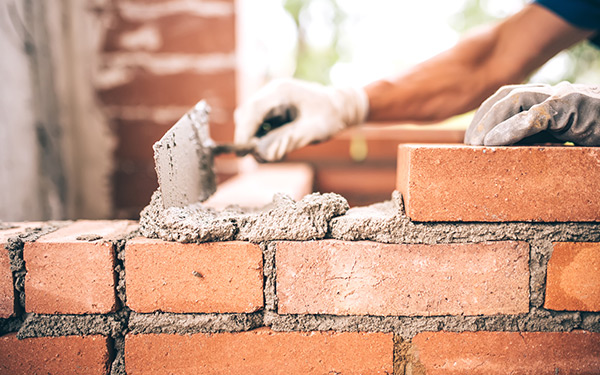Unlocking the Tricks of Lasting Stonework Construction Practices for Eco-Friendly Buildings
In the realm of modern-day building and construction, the quest of lasting techniques has actually ended up being paramount. Among the myriad strategies to green structure, sustainable stonework construction stands out as a tried and true and long lasting approach that holds a wide range of untapped potential. From the selection of products to cutting-edge building and construction methods, the keys to attaining sustainability within stonework construction are multifaceted and appealing. By discovering the advantages, materials, strategies, and future patterns of lasting stonework, a deeper understanding of how these methods can shape the future of environmentally friendly buildings emerges.
Benefits of Sustainable Stonework Building And Construction
Accepting lasting masonry building methods not only decreases ecological influence but additionally provides long-term financial advantages to home builders and areas. By utilizing products like recycled blocks, blocks, and rocks, contractors can dramatically decrease the carbon footprint of their projects while advertising source efficiency. In addition, sustainable masonry building methods, such as correct insulation and thermal mass buildings, can improve power performance within buildings, resulting in minimized functional costs gradually.
Furthermore, the durability and strength of masonry frameworks contribute to long-lasting financial benefits. Structures constructed using lasting masonry methods often call for less upkeep and repair service, equating to cost savings for contractors and homeowner. The longevity of stonework products likewise makes certain that structures continue to be secure and safe and secure, decreasing the demand for constant remodellings or replacements.
Eco-Friendly Stonework Products
Utilizing environmentally friendly masonry materials is an essential action towards boosting the sustainability of building and construction practices and lessening ecological influence while optimizing lasting economic advantages. Lasting stonework materials are sourced, created, and utilized in a fashion that lowers general environmental influence. Products such as recycled bricks, redeemed stone, and sustainable cinder block are ending up being significantly popular selections for eco-conscious contractors. Recycled bricks, as an example, not only draw away waste from landfills yet likewise need less energy to create compared to new bricks. Reclaimed stone supplies a distinct visual allure while lowering the demand for new quarrying. Sustainable concrete blocks include recycled accumulations and may feature better insulation residential properties, adding to energy performance in buildings.
Moreover, natural materials like adobe, rammed planet, and straw bales give exceptional thermal mass homes, lowering the requirement for home heating and cooling energy. These materials are usually locally available, promoting local economies and lowering transportation-related carbon exhausts. By picking environment-friendly stonework materials, building and construction projects can dramatically decrease their ecological impact and add to the creation of healthier, more lasting constructed environments.
Energy-Efficient Masonry Strategies
Power efficiency plays a crucial role in improving the sustainability of stonework construction practices. By carrying out energy-efficient stonework techniques, contractors can considerably reduce the total energy consumption of a building, causing lower operational expenses and a smaller environmental impact. One key energy-efficient masonry strategy is making use of thermal mass, which entails including thick materials like concrete or block right into the structure's framework to absorb and keep warm. This assists control interior temperature levels, minimizing the requirement for mechanical heating and cooling down systems.

Innovations in Sustainable Masonry
Current developments in lasting masonry practices have brought around innovative methods that are reshaping the building and construction industry. One such technology is the advancement of self-healing concrete, which utilizes microorganisms embedded within the concrete to heal splits autonomously. This innovation not just reduces maintenance expenses yet additionally enhances the longevity of masonry structures, adding to their sustainability.
Another significant innovation is making use of recycled aggregates in stonework construction - masonry contractor. By integrating products such as crushed ceramic waste or recycled glass into concrete mixes, building contractors can reduce the environmental effect of building jobs while keeping architectural integrity. This technique not just draws away waste from landfills however additionally conserves natural resources, making it an essential advancement in sustainable masonry construction
Moreover, the combination of digital design tools, such as Building Information Modeling (BIM), is changing the means stonework frameworks are planned and created. BIM enables even more exact estimations, reduced product waste, and enhanced energy performance, ultimately leading to even more lasting structure techniques. These developments collectively signify a promising future for lasting masonry building and local stamped concrete contractors construction in the period of eco-friendly buildings.
Future Trends in Masonry Sustainability
With the ingenious strides made in sustainable stonework practices, the future trends in stonework sustainability are poised to further reinvent the construction sector. One of the key fads forming the future of stonework sustainability is the boosted combination of technology. Innovations such as Structure Details Modeling (BIM) and online reality simulations are being made use of to optimize masonry construction procedures, resulting in reduced material waste and boosted energy performance in structures.
In addition, the development of unique sustainable materials is readied to play a substantial role in boosting the eco-friendliness of stonework building and construction. masonry contractor. Advancements like self-healing concrete, recycled aggregates, and bio-based binders are getting traction for their ability to decrease environmental influence while maintaining structural integrity

Verdict
Finally, sustainable masonry building practices offer various benefits for environmentally friendly structures. By utilizing environmentally friendly materials and energy-efficient techniques, stonework can contribute to a more sustainable built atmosphere. Innovations in sustainable masonry are continuously being developed to even more improve the environmental performance of buildings. Looking towards the future, the pattern of masonry sustainability is expected to expand, leading to more ecologically friendly and energy-efficient construction practices in the years to come.